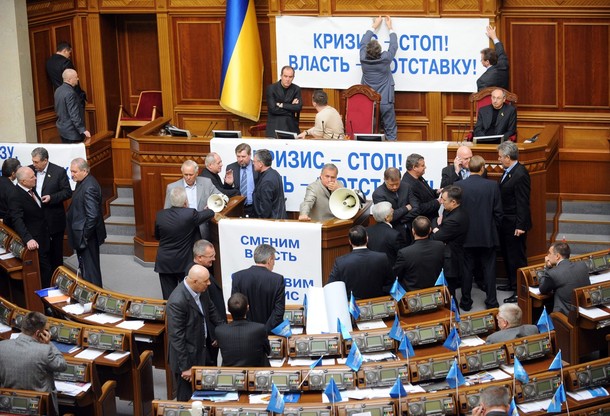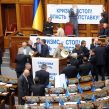
Will the Ukrainian Parliament be Disbanded?
Publication: Eurasia Daily Monitor Volume: 6 Issue: 130
By:

Ukrainian President Viktor Yushchenko may return to the idea of disbanding parliament and call snap elections. The opposition Party of Regions (PRU), which has the largest caucus in parliament, has disrupted parliament’s work following its leader Viktor Yanukovych’s failure to form a grand coalition with Prime Minister Yulia Tymoshenko’s bloc (BYT). BYT is the only major force that is decidedly against holding snap elections. Apparently, it is only the uncertainties surrounding the legal basis of the move that prevents Yushchenko from dissolving the legislature.
In late June, the PRU started blocking the rostrum in parliament, making the procedure of voting physically impossible. The PRU is determined to continue this action until Tymoshenko’s coalition agrees to increase national wages and pensions. Such a populist move is hardly possible now, since the state coffers are empty following the 20 percent GDP contraction in the first quarter of 2009, as Ukraine has been the nation worst hit by the global recession within Eastern Europe and the CIS. Tymoshenko’s cabinet struggles to contain the budget deficit within the 4 percent allowed by the IMF, otherwise the IMF might delay the disbursal of its $16.4 billion stand-by loan-without which the Ukrainian budget will collapse. If the PRU’s demands on wages and pensions are met, the state finances may slip out of control.
The PRU understands that there is a very slim chance that its conditions will be met. However, even if Tymoshenko bows to this pressure and agrees to increase wages and pensions, the PRU will hardly stop its destructive activities in parliament, as it has formulated a set of additional demands which, if met, would dissolve the ruling coalition. These include dismissing the ministers of interior, education and culture (www.proua.com, June 26). These three ministers have cemented the coalition as representatives of its junior partners, the Self-Defense group of the Interior Minister Yury Lutsenko and several nationalist groups. If they are removed, the coalition will cease to exist, and Tymoshenko will be undermined as prime minister.
Yanukovych said that snap parliamentary elections should ideally coincide with the presidential elections scheduled for January 17 (Interfax-Ukraine, July 2). However, Yanukovych has stopped short of admitting that his party has actively disrupted parliament’s work in order to prompt Yushchenko to disband it. His "shadow finance minister" Mykola Azarov is more forthcoming. During a recent press conference, he admitted that the PRU would push for snap parliamentary elections if its demands regarding wages and pensions are not met (Interfax-Ukraine, July 3).
Yushchenko has not yet reacted to the PRU’s initiative, although he is known to favor the dissolution of parliament. He is apparently uncertain that he has sufficient legal grounds to dissolve the legislature. He tried to do so last fall, but the BYT managed to block it with the help of the courts, and Yushchenko subsequently suspended his dissolution decree, through which snap parliamentary elections were scheduled for December 7, 2008. According to the Zerkalo Nedeli weekly, Yushchenko is considering the possibility of reviving the decree. This would be a legally dubious option, since the constitution provides for holding snap elections within 60 days from the signing of the respective presidential decree, and that term has long since expired. Zerkalo Nedeli suggested that Yushchenko might issue a new decree to dissolve parliament based on its inability to function, partly since Tymoshenko’s coalition lacks a majority (Zerkalo Nedeli, July 4).
There is little time remaining for Yushchenko to consider these options. According to the constitution, the president may not dissolve parliament within six months of his term expiring. Parliamentary Speaker Volodymyr Lytvyn said that Yushchenko can dissolve parliament on July 24 at the latest, as his term should expire on January 23, 2010 (www.proua.com, July 6). If Lytvyn is correct and the PRO’s goal was to prompt Yushchenko to dissolve parliament, then they left it too late to obstruct its functioning. One indisputable legal option for the president to dissolve the legislature is in the event that it proves unable to work for one month, but the blockade of the rostrum by the PRU started on June 26, and there will be less than 30 days until July 24.
The PRU is so fixed on snap elections because its popularity has probably peaked, while that of the BYT is set to slump as it steers the government during a period of deep economic crisis. According to the latest opinion poll by the Kyiv International Institute of Sociology, the PRU would secure 37 percent of the vote had the elections been held in June, while the BYT would muster only 21 percent, followed by the party of former speaker Arseny Yatsenyuk with 15 percent. Moreover, the poll showed that Yatsenyuk’s party might defeat Tymoshenko’s in her stronghold of West Ukraine (Ukrainska Pravda, July 2).




